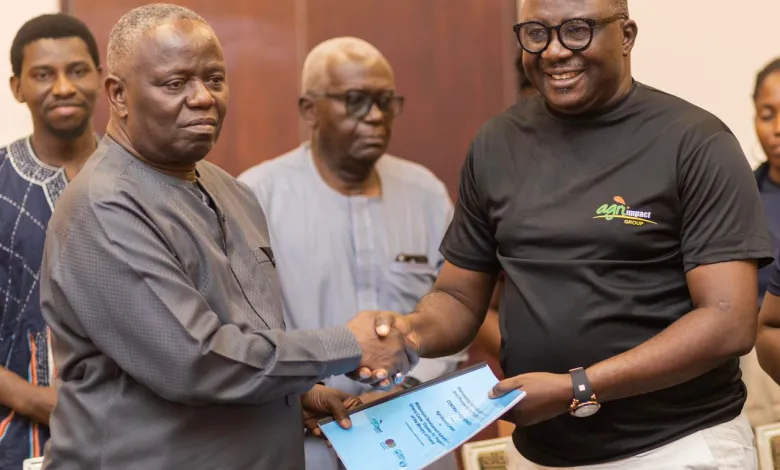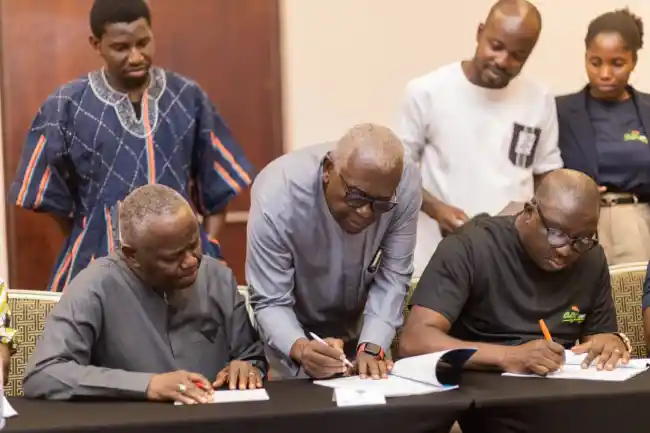The MasterCard Foundation and the Millennium Development Authority (MiDA) have joined forces in a groundbreaking $6.1 million deal aimed at revolutionizing Ghana’s rice sector.
This collaboration signifies a significant step toward transforming the rice value chain through the implementation of the Harnessing Agricultural Productivity and Prosperity for Youth (HAPPY) programme. The formal contract signing ceremony, held in Accra marked the commencement of a five-year project set to extend its impact until May 31, 2028.
The primary beneficiary of this ambitious initiative is the Kasunya Economic Enclave Project, a crucial component of the Ghana CARES/Obaatan Pa programme under the Ministry of Finance. The project’s focus on the rice value chain aims to operationalize 6,000 acres out of 10,000 in the Kasunya region, emphasizing innovation, training, skill development, and implementation support.
The MasterCard Foundation’s grant will serve as initial working capital for primary production actors involved in the rice sector. This strategic funding will be used to elevate the rice value chain and stimulate economic prosperity in the region. The disbursement period is set to span four years, from December 1, 2023, to November 31, 2027, with the project itself running until May 31, 2028.

The success of the HAPPY programme relies on collaborative efforts with key partners, including the Ministry of Food and Agriculture (MoFA), Ghana Irrigation Development Authority (GIDA), National Entrepreneurship and Innovation Programme (NEIP), 48 Engineers Regiment of the Ghana Armed Forces, and private sector anchor farmers. This diverse network of collaborators brings technical expertise and support to ensure the program’s success.
Positive Outlook and Anticipated Outcomes
With dignitaries such as Ken Ofori Atta, Minister for Finance, and Professor Yaa Ntiamoa-Baidu, board chair of MiDA, in attendance, the ceremony symbolized a convergence of influential figures dedicated to driving positive change in Ghana’s agricultural sector. Minister Ken Ofori-Atta highlighted the strategic importance of the collaboration, emphasizing the focus on innovation, training, skill development, and strategic support in the rice value chain.
The minister expressed commitment to leveraging the funding to provide working capital for primary production actors, paving the way for increased job creation and a projected 20% boost in national rice output. Over the next four years, the collaborative effort anticipates remarkable outcomes, including the creation of 38,269 jobs, with 70% designated for women.
Additionally, the program aims for the cultivation of 2,560 hectares of rice and a substantial reduction in rice import costs, expected to surpass US$45 million, highlighting its commitment to catalyzing sustainable growth in Ghana’s rice sector.
The HAPPY programme’s success hinges on a well-structured plan for the operationalization of the rice value chain in the Kasunya region. Key strategies include leveraging the expertise of collaborating partners and ensuring effective training and skill development programs for all stakeholders involved. The engagement with private sector anchor farmers and the 48 Engineers Regiment of the Ghana Armed Forces brings a unique blend of experience, resources, and innovation to the project.
Innovation and Technology Integration
To enhance productivity and efficiency in the rice sector, the project aims to incorporate innovative agricultural practices and technology. This includes the adoption of modern irrigation methods facilitated by GIDA, the introduction of advanced farming equipment, and the implementation of data-driven approaches to optimize crop yields. Embracing innovation is crucial for sustainable growth and ensuring the long-term success of the initiative.
One of the standout features of the HAPPY programme is its commitment to job creation, with an anticipated 38,269 new positions over the next four years. Importantly, 70% of these jobs are earmarked for women, contributing significantly to gender empowerment and economic inclusivity.

This deliberate effort to involve women in the workforce aligns with broader goals of promoting gender equality and fostering inclusive economic development.
The programme’s target of a 20% increase in national rice output is a bold ambition that requires a multifaceted approach. Beyond direct interventions in the Kasunya region, the initiative includes knowledge-sharing platforms, farmer training, and the dissemination of best practices to boost rice production across the country.
Moreover, by reducing rice import costs by more than US$45 million, the programme aims to enhance food security and contribute to the nation’s economic resilience.
READ ALSO: NDC-NPP “X-Contest” Over Deteriorated Cocoa Roads






















